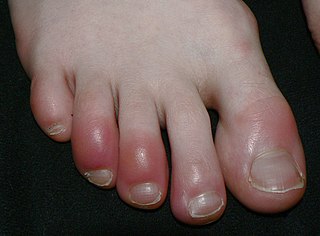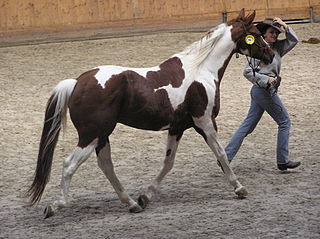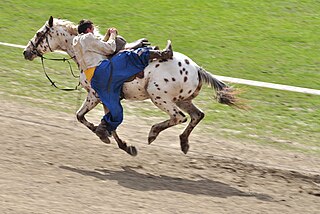Related Research Articles

The horse is one of two extant subspecies of Equus ferus. It is an odd-toed ungulate mammal belonging to the taxonomic family Equidae. The horse has evolved over the past 45 to 55 million years from a small multi-toed creature, Eohippus, into the large, single-toed animal of today. Humans began domesticating horses around 4000 BC, and their domestication is believed to have been widespread by 3000 BC. Horses in the subspecies caballus are domesticated, although some domesticated populations live in the wild as feral horses. These feral populations are not true wild horses, as this term is used to describe horses that have never been domesticated, such as the endangered Przewalski's horse, a separate subspecies, and the only remaining true wild horse. There is an extensive, specialized vocabulary used to describe equine-related concepts, covering everything from anatomy to life stages, size, colors, markings, breeds, locomotion, and behavior.

Equestrianism, more often known as horse riding or horseback riding, refers to the skill and sport of riding, driving, steeplechasing or vaulting with horses. This broad description includes the use of horses for practical working purposes, transportation, recreational activities, artistic or cultural exercises, and competitive sport.

The 1956 Summer Olympics, officially known as the Games of the XVI Olympiad, was an international multi-sport event that was held in Melbourne, Victoria, Australia, from 22 November to 8 December 1956, with the exception of the equestrian events, which were held in Stockholm, Sweden, in June 1956.

An equestrian statue is a statue of a rider mounted on a horse, from the Latin "eques", meaning "knight", deriving from "equus", meaning "horse". A statue of a riderless horse is strictly an "equine statue". A full-sized equestrian statue is a difficult and expensive object for any culture to produce, and figures have typically been portraits of rulers or, more recently, military commanders.

Chilblains — also known as perniones, chill burns and perniosis — is a medical condition that occurs when a predisposed individual is exposed to cold and humidity, causing tissue damage. It is often confused with frostbite and trench foot. Damage to capillary beds in the skin causes redness, itching, inflammation, and sometimes blisters. Chilblains can be reduced by keeping the feet and hands warm in cold weather, and avoiding extreme temperature changes. Chilblains can be idiopathic, but may also be a manifestation of another serious medical condition that must be investigated. A history of chilblains suggests a connective tissue disease. Chilblains may also be caused by Raynaud's disease. In infants, chilblains together with severe neurologic disease and unexplained fevers occurs in Aicardi–Goutières syndrome, a rare inherited condition. Ulcerated chilblains are referred to as kibes.

Botflies, also known as warble flies, heel flies and gadflies, are a family of flies technically known as Oestridae. Their larvae are internal parasites of mammals, some species growing in the host's flesh and others within the gut. The Dermatobia hominis is the only species of botfly known to parasitize humans routinely, though other species of flies cause myiasis in humans.

Skewbald is a colour pattern of horses. A skewbald horse has a coat made up of white patches on a non-black base coat, such as chestnut, bay, or any colour besides black coat. Skewbald horses which are bay and white are sometimes called tricoloured. These horses usually have pink skin under white markings and dark skin under non-white areas. Other than colour, it is similar in appearance to the piebald pattern. Some animals also exhibit colouration of the irises of the eye that match the surrounding skin. The underlying genetic cause is related to a condition known as leucism. The term is also used to describe spotting patterns in various other animals, such as goats.
The United States Equestrian Team, or USET, was founded in 1950 at the Coates estate on van Beuren Road in Morristown, New Jersey, and is the international equestrian team for the United States. With the assistance of financier and philanthropist Finn M. W. Caspersen (1941–2009) and Beneficial Corporation, the USET relocated to its current headquarters Hamilton Farm in Gladstone, New Jersey.
A saddle sore in humans is a skin ailment on the buttocks due to, or exacerbated by, horse riding or cycling on a bicycle saddle. It often develops in three stages: skin abrasion, folliculitis, and finally abscess.

France competed at the 1948 Summer Olympics in Wembley Park, London, England. 316 competitors, 279 men and 37 women, took part in 135 events in 20 sports.

Germany was represented at the 1956 Summer Olympics by a United Team of Germany of athletes from the Federal Republic of Germany (FRG) and, for the first time at Summer Games, also from the German Democratic Republic (GDR) which had not joined in 1952. Also, the Saarland athletes who had to enter as a separate team in 1952 could now join in even though the accession of their state was not yet in effect. Thus, this was the only Olympic team ever to comprise athletes from three German states.

Norway competed at the 1956 Summer Olympics in Melbourne, Australia and Stockholm, Sweden. 22 competitors, 19 men and 3 women, took part in 18 events in 6 sports.

Nazi Germany was the host nation and top medal recipient for the 1936 Summer Olympics in Berlin. 433 competitors, 389 men and 44 women, took part in 143 events in 22 sports.

Mexico competed at the 1948 Summer Olympics in London, England. 88 competitors, 81 men and 7 women, took part in 57 events in 14 sports.
A horse length, or simply length, is a unit of measurement for the length of a horse from nose to tail, approximately 8 feet (2.4 m).

Jigit, in some Turkic languages also spelled as yigit, zhigit or igid, is a word of Turkic origin which is used in the Caucasus and Central Asia to describe a skillful and brave equestrian, or a brave person in general.

Equestrian Village is an unincorporated community in El Dorado County, California. It lies at an elevation of 646 feet.

Susan Seipel is an Australian Para-canoeist, a gold and bronze medallist in kayak and outrigger canoe at the 2015 and 2016 World Championships. She won a bronze medal at the 2016 Rio Paralympics.

Sharon Jarvis is an Australian para-equestrian. She represented Australia at the 2016 Rio Paralympics.
Anne Skinner is an Australian para-equestrian. She represented Australia at the 2000 Sydney Paralympics and 2004 Athens Paralympics.
References
- ↑ James, William D.; Berger, Timothy G.; Elston, Dirk M.; Neuhaus, Isaac M. (2015). Andrews' Diseases of the Skin: Clinical Dermatology (12th ed.). Elsevier. ISBN 978-0323319676.
| This cutaneous condition article is a stub. You can help Wikipedia by expanding it. |
| This equine-related article is a stub. You can help Wikipedia by expanding it. |